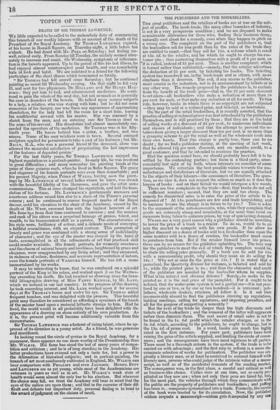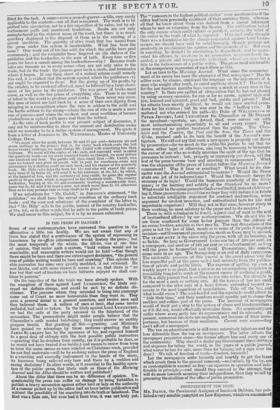THE PUBLISHERS AND THE BOOKSELLERS.
THE great publishers and the retailers of books are at war on the subject of profits. The book-trade, like many other branches of industry, is not in a very prosperotis condition ; and .we are disposed to make considerable allowances for those who, finding their business decay, naturally-cast about for a remedy, even when they happen to pitch on a wrong one. The complaint on the part of the publishers is, that the booksellers sell for less profit than by the rules of the trade they are entitled to exact,--that they sell for 15s. a volume which is rated at 13s. 4d. to the retailer, and for which he ought to charge his customer 208. ; thus contenting themselves with a profit of 8 per cent, as 'it is called, instead of 33 per cent. There is another complaint, which is formal rather than substantial,—namely, that the retailer advertises the deduction of 25 per cent. by ticketing his books. The ticketing system has been dwelt on, in the book-trade and in others, with more emphasis than it deserves. The evil, if any accrue to the publisher, must consist in the reduction, not in its announcement by tickets or in any other way. The remedy proposed by the publishers is, to exclude from the benefit of the trade price—that is, the 33 per cent. discount to ret ailers—all booksellers who make a reduction of more than 10 per cent. for cash, or that make any reduction at all for credit. To this rule, however, books in which there is no copyright are not subjected —they may be sold at a reduced price, and ticketed, as heretofore. On the part of the retail booksellers, it is roundly asserted, that the practice of selling at reduced prices was first introduced by the publishers themselves, and is still practised by them ; that they are in the habit of selling works at a discount of 25 per cent., to numerous individuals and classes of individuals ; and that the attempt to prevent the retailers from giving a larger discount than ten per cent. is no more than a grasping scheme to get the retail as well as the wholesale trade into their own hands. That this charge is partly true, there can be no doubt ; for we 'find a publisher stating, at the meeting of last week, that he allowed 121 per cent. discount, and six months credit, to a good customer, and that he intended to continue the practice. Had the question rested here, we should probably have left it to be settled by the contending parties ; but there is a third party, unaccountably lost sight of by both, whose interests we consider of some importance. We entertain the best possible wishes towards the manufacturers and distributors of literature, but we are equally attached to the objects of their labours—the consumers of literature. The question, as we view it, does not respect the sellers so much as it does the buyers of books : and on their behalf we would interpose a few words. There are two complaints in the trade—first, that books do not sell in sufficient numbers ; second, that they are sold too cheap. The remedy for diminished sales is to raise the price of the article to be disposed of ! At 15s. purchasers are few and trade languishing, and to increase beyers the charge is in future to be 18s.! This is a-kin to the argument of the anti-economists, who, while they complain that goods are ruinously cheap and unsaleable, at the same time insist on measures being taken to enhance prices, by way of quickening demand. We can see a very good reason why a publisher should be unwilling to lower the price of a book to a reader. To do so, would be to go into the market to compete with his own goods. If he allow no higher discount on a dozen of books sold to a bookseller than upon the same number sold to a dozen of readers, the bookseller must cease to purchase from him. But if the retailer himself lower his prices, there can be no reason for the publisher upholding his. The true way for the publishers to meet the evil of which they complain would be, to abate the selling price generally. If a book can be sold for 15s. with a remunerating profit, why should they insist on its selling for 18s.? Why not at once fix the price at 15r.? It is stated that a periodical, the Quarterly Review for instance, is ticketed and sold for 5s., while the printed price is Gs.; and thus the character and credit of the publisher are assailed by the bookseller whom he supplies. What is his natural and obvious defence ? Surely,.to make 5s. the printed as it is the real price of the pamphlet. For it ought to be noticed, that the under-price system is not a partial one—it is not prac tised by one or tWro, or by one or two hundred—it is universal ; publishers, wholesale dealers, retailers, all follow it. Is it not then inconceivably absurd to find the publishers drawing up regulations, holding meetings, calling for signatures, and imposing penalties, and all for the purpose of supporting a nonentity ? But the evils of the trade lie deeper than the high discounts and tickets of the booksellers ; and the removal of the latter will aggravate rather than diminish them. The real secret of small sales is not to be found in the Is. 6d. profit which the retailer charges, or in the 3s. 6d. which, according to the publishers, he ought to charge, but in the 13s. ad. of prime cost. In a word, books are much too highly rated in the first instance. For years past, publishers have been raising the price of the article supplied, and limiting the circle of consu mers; and the consequences have been most injurious to all parties. There must be a thorough reform in the system, if the trade is to be carried on with advantage ; and the first step to reform is a more dis criminate selection of works for publication. The publisher was ori ginally a literary man, or at least he contrived to connect himself with literary men, persons who could judge of the intrinsic value of a manu script, as well as of the accidental demands of the reading market. The consequence was, in the first place, a careful and critical as well as business-like choice. Critics were at one time, not so easily prc pitiated as they now are ; when not only their pens are hired by, but, for the most part, the vehicles through which they communicate with the public are the property of publishers and booksellers ; and puffing has been in ...ansequence systematized into a trade. Formerly, the merits of the book were trusted to for its circulation. Now, the publisher seldom inspects a manuscript—seldom gets itinspected by any °iv fitted for the task. A name—even a nom-de-guerre—a title, very rarely applicable to the contents—are all that is required. The work is to be pushed into circulation, not by a fair exposition of its value, but by advertisement puffs and purchased laudations. Books are not only manufactured in the strictest sense of the word, but there is as much quackery displayed in the disposal of them as in the vending of a patent medicine. The quantity of utter trash that has issued from the press under this system is incalculable. What has been the issue ? One work out of ten has sold, for which the public have paid enormously; and the remainder have lingered on the shelves of the publisher and the bookseller, to the ruin of both. Every four or five years we have a smash among the booksellers—why? Because trade sales are become so in every sense—they are not only sales to the trade, but in the trade: the process goes on in a circle, and terminates where it began. If any thing short of a radical reform could remedy this evil, it is evident that the system against which the publishers cry out might be expected to do so. But the giving up of his profits by the retailer, to be rendered effectual, must be followed by a large abatement of his price by the publisher. The war prices of books must cease, as well as the war prices of everything else. There is no want of talent in the world to produce good works. There never was more. But men of talent are held back by a sense of their own dignity from mingling in a competition where the race is seldom to the swift and the battle seldom to the strong—where the run of wits is made a mere run of purses—and where the weakest and most worthless of human productions is upheld with more zeal than the noblest. As the rate of book profits is our present subject of discussion, it may not be uninteresting to show the amount and distribution under what we consider to be a 'better system of management. We quote it from a letter of JOHNSON to Dr. WETHERELL, Master of University College, Oxon. "We must allow for profit, between 30 and 35 per cent—between six and seven shillings in the pound ; that is, for every book which costs the last buyer twenty shillings, we must charge Mr. Cadell with something less than fourteen. We must sell the copies at 14s. each, and superadd what is called the quarterly book—or for every hundred books so charged, we must deliver one hundred and four. The profits will then stand thus :—Mr. Cadell, who runs no hazard and gives no credit, will be paid for warehouse-room and attendance by a shilling profit on each book, and his chance of the quarterly book. Mr. Dilly, who buys the book for 15s. and who will expect the quarterly book if he takes 25, will send it to his customer at 16s. 6d.; by which, at the hazard of loss, and the certainty of long credit, he gains the regular profit of 10 per cent, which is expected in the wholesale trade. The country bookseller, buying at 16$. 6(1. and commonly trusting a considerable time, gains but Sr. 6d. and if he trust a year, not much more than 2$. 6d. otherwise than as he may perhaps take as long credit as he gives."
If we substitute for "Mr. Cadell," in JOHNSON'S statement, "the publisher," we shall have the actual condition of the ordinary book trade ; and the sum and substance of the complaint of the latter is, that "Mr. Dilly" sells to the public, instead of the country bookseller, at 16s. 6d., or in other words, that he sells to the public at trade prices. We shall recur to this subject, for it is by no means exhausted.



















 Previous page
Previous page